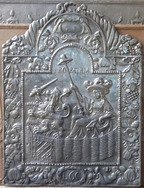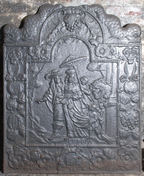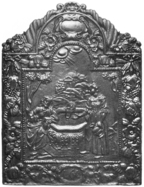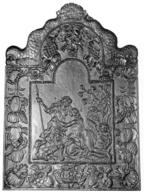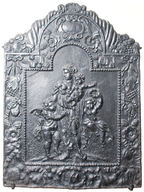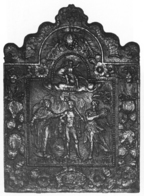-
1212
Description: Arched rectangular central panel with bead edging; wickerwork Garden of Holland (Hollandse Tuin) within which is seated a berobed female figure holding a cap of freedom on the end of a long pole; before her is the crowned heraldic lion of the States General of the Netherlands, clutching a sheaf of arrows in its left front paw; above are the words, Pro Patria; arched rectangular border with fillet edging; central cartouche at top, with festoons of fruit, flowers and leaves suspended on each side from ribbons supported by rings; at the bottom, swirled ribbon around an oval compartment bearing the inscription 'L6C'; on top, a central cartouche from which descend a cornucopia on each side of the arch.
Notes: An overtly patriotic theme with symbols of Dutch nationhood; the inscription at the bottom indicates the style of border; other firebacks with the same inscription have the same border; similar inscriptions (e.g. L7C and L8G) indicate different borders.
Inscription: PRO PATRIA / L6C
- Decoration tags:
- 'Dutch' (shape)
- fillet (edging)
- whole carved pattern
- pictorial
- allegorical
- text
- animals
- humans
- plants
- objects
Manufactured: in the late-17th century in the Siegerland area of Germany.
Current location: not known.
- Attached to series:
- 'Dutch' LC/G series
- 'Dutch' Garden of Holland firebacks
-
219
Description: Arched rectangular central panel with bead on fillet edging, pictorial representation of a man and woman walking, behind the woman a child holds her train and a young person carries a parasol; from behind a column on the right, a horse's head is visible, a tree stands to the left, at the foot of the scene is the word 'EUROPA'; arched rectangular border with fillet edging, from a central bunch of grapes at the top of the arch, a ribbon on each side suspends bunches of fruit and flowers; at the bottom a central cartouche containing the inscription 'L7G', with flowers on each side;; on top are two mirrored dolphins.
Notes: The pictorial scene is based on an engraving c.1642 of Friedrich Wilhelm, Elector of Brandenburg, and his wife, Luise Henriette of Oranje-Nassau, by Mathias Czwiczek; one of series of firebacks depicting allegories of the four continents; the initials, L7C, denote the style of border - other firebacks having the same inscription have the same border - and other borders are denoted by similar inscriptions (e.g. L6C and L8G).
Copies of this fireback are known.
Inscription: EVROPA / L7C
Manufactured: in the mid- to late-17th century in the Siegerland area of Germany.
Current location: Preston Manor, Brighton, East Sussex, England.
Museum number: HA105000 (part of the Brighton Museum museum group)
- Attached to series:
- 'Dutch' LC/G series
- 'Dutch' Continents firebacks
-
1239
Description: Arched rectangular central panel with bead-on-fillet edging; pictorial scene of Jesus sitting at the well with the woman of Samaria standing opposite, a rural scene behind, trees on each side and clouds with sunrays above; arched rectangular border with fillet edging; central cartouche at top, with festoons of fruit, flowers and leaves suspended on each side from ribbons supported by rings; at the bottom, swirled ribbon around an oval compartment bearing the inscription 'L6C'; on top, a central cartouche from which descend a cornucopia on each side of the arch.
Notes: The scene, seen on many German firebacks and stoveplates, is from St John's gospel, chapter 4; the inscription at the bottom indicates the style of border; other firebacks with the same inscription have the same border; similar inscriptions (e.g. L7C and L8G) indicate different borders.
Copies of this fireback are known.
Inscription: L6C
Manufactured: in the mid- to late-17th century possibly in the Siegerland area of Germany.
Current location: Vreden, Nordrhein-Westfalen, Germany.
Citation: Elling, W. & Winkler-Borck, S., 1992, Ofen- und Kaminplatten (Vreden, Hamaland-Museum).
- Attached to series:
- 'Dutch' LC/G series
-
310
Description: Arched rectangular central panel with bead edging; pictorial scene of Venus, naked and kneeling, and Adonis, standing, holding a spear in his left hand, with Cupid to the left, and a hound and a quiver of arrows below to the right; arched rectangular border with fillet edging; descending swags of fruit and seashells enclosing the central panel; inscription in an oval cartouche at the bottom; on top, a Holy Roman Imperial crown between two mirrored dolphins, heads downward.
Notes: The scene is based on the painting (c.1635) of Venus and Adonis by Peter Paul Rubens; the initials, L8G, denote the style of border - other firebacks having the same inscription have the same border - and other borders are denoted by similar inscriptions (e.g. L6C and L7C). Von den Driesch (p.520) illustrates the same central image within an L7C border.
Copies of this fireback are known.
Inscription: L8G
- Decoration tags:
- 'Dutch' (shape)
- fillet (edging)
- whole carved pattern
- pictorial
- mythological
- text
- humans
Manufactured: in the late-17th century in the Siegerland area of Germany.
Current location: Hampton Court Palace, Richmond, Greater London, England.
Museum number: 1042 (part of the Royal Collection museum group)
- Attached to series:
- 'Dutch' LC/G series
- 'Dutch' Venus and Adonis firebacks
-
540
Description: Arched rectangular central panel with bead edging; pictorial scene of Venus sitting in a couch, with two other females, swathed in drapery, a putto holding an oval mirror to her left; Arched rectangular border with fillet edging; central cartouche at top, with festoons of fruit, flowers and leaves suspended on each side from ribbons supported by rings; at the bottom, swirled ribbon around an oval compartment bearing the inscription; on top, a central cartouche from which descend a cornucopia on each side of the arch.
Notes: The design is a copy of 'The Toilet of Venus' by Simon Vouet (c.1640); the image has been reversed. The inscription indicates the style of border; other firebacks with the same inscription have the same border; similar inscriptions (e.g. L7C and L8G) indicate different borders. Von den Driesch (p.517) illustrates the same central image within an L8G border. Mitford collection, Petworth House.
Copies of this fireback are known.
Inscription: L6C
- Decoration tags:
- 'Dutch' (shape)
- fillet (edging)
- whole carved pattern
- pictorial
- mythological
- text
- humans
Manufactured: in the mid- to late-17th century in the Siegerland area of Germany.
Current location: Petworth House, Petworth, West Sussex, England.
Museum number: NT/PET/M/95 (part of the National Trust museum group)
- Attached to series:
- 'Dutch' LC/G series
-
541
Description: Arched rectangular central panel with bead edging; pictorial scene of a female holding a small child, with two putti, one on each next side of her; arched rectangular border with fillet edging; central cartouche at top, with festoons of fruit, flowers and leaves suspended on each side from ribbons supported by rings; at the bottom, swirled ribbon around an oval compartment bearing the inscription; on top, a central cartouche from which descend a cornucopia on each side of the arch.
Notes: The allegorical figure of Charity; the inscription indicates the style of border; other firebacks with the same inscription have the same border; similar inscriptions (e.g. L7C and L8G) indicate different borders. Mitford collection, Petworth House.
Copies of this fireback are known.
Inscription: L6C
- Decoration tags:
- 'Dutch' (shape)
- fillet (edging)
- whole carved pattern
- pictorial
- allegorical
- text
- humans
Manufactured: in the mid- to late-17th century in the Siegerland area of Germany.
Current location: Petworth House, Petworth, West Sussex, England.
Museum number: NT/PET/M/96 (part of the National Trust museum group)
- Attached to series:
- 'Dutch' LC/G series
-
1273
Description: Arched rectangular central panel with bead on fillet edging, pictorial scene of Hercules standing, right arm akimbo and left hand holding a club that rests on his shoulder; to his right the allegorical female figure of Virtue, clothed and resting her left hand on Hercules's right shoulder; to his left the female allegorical figure of Volupta, the pair symbolising the 'crossroads' where Hercules has to decide which path in life to take; below them the text VIRTUS HERCULES VOLUPTA; above, seated above clouds, Jupiter surveys the scene, the word IVPITER below; arched rectangular border with fillet edging, from a central bunch of grapes at the top of the arch, a ribbon on each side suspends bunches of fruit and flowers; at the bottom a central cartouche containing the inscription 'L7G', with flowers on each side;; on top are two mirrored dolphins, their tails covering a bunch of grapes.
Notes: The pictorial scene is loosely based on The Judgement of Hercules, c.1636-7, by Nicholas Poussin. The inscription at the bottom indicates the style of border; other firebacks with the same inscription have the same border; similar inscriptions (e.g. L6C and L8G) indicate different borders. Image from von den Driesch (p. 512).
Copies of this fireback are known.
Inscription: IVPITER / VIRTVS HERCVLES VOLVPTA / L7C
- Decoration tags:
- 'Dutch' (shape)
- fillet (edging)
- whole carved pattern
- pictorial
- mythological
- allegorical
- text
- humans
Manufactured: in the mid- to late-17th century in the Siegerland area of Germany.
Current location: not known.
- Attached to series:
- 'Dutch' LC/G series
